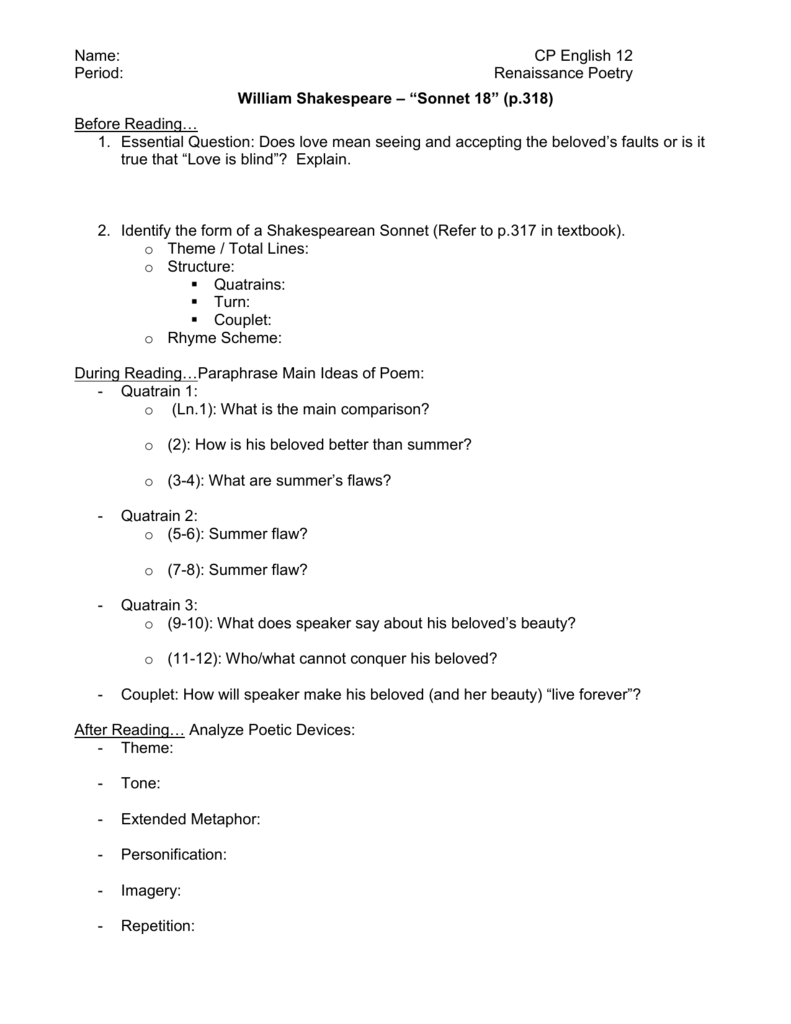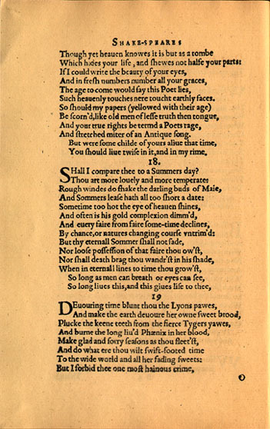

The major themes in Sonnet 18 are the timelessness of love and beauty, death and immortality, and in particular the immortality of art and subject matter. Scholars have identified three subjects in this collection of poems-the Rival Poet, the Dark Lady, and an anonymous young man known as the Fair Youth. The poem was originally published, along with Shakespeare's other sonnets, in a quarto in 1609. Herein, who is Shakespeare talking about in Sonnet 18? The poet notes that beautiful days and seasons do not last but declares that his love's “eternal summer shall not fade” because his poem makes his love immortal: “So long as men can breathe or eyes can see, / So long lives this, and this gives life to thee.” We will first interpret this sonnet line by line: He is comparing his love to a summer's day.) Thou art more lovely and more temperate: ( Shakespeare believes his love is more desirable and has a more even temper than summer.)įurthermore, should I compare thee to a summer's day meaning? The first line of a sonnet by William Shakespeare. Shakespeare compares his love to a summer's day in Sonnet 18. Then, what does Shakespeare's Sonnet 18 mean? The idea of mortality is overcome since the poem preserves the moment.And summer is fleeting: its date is too short, and it leads to the withering of autumn, as “every fair from fair sometime declines.” The final quatrain of the sonnet tells how the beloved differs from the summer in that respect: his beauty will last forever (“Thy eternal summer shall not fade”) and never die. Even though Death is mentioned in the poem, Death is not the fate of the subject. Choose such an idea and write an original sonnet, following one of the patterns identified above (Italian or English). The idea of mortality and the passing of time creates a melancholy tone for this love poem. Writing a Sonnet: The theme of a sonnet is usually related to an elevated, abstract idea such as love, devotion, patriotism, honor, fidelity, etc. However, that is not the only major theme present. Like many sonnets of this time period, Shakespeare's Sonnet 18 also has a theme of love. The couplet gives a definitive statement that his love will always be beautiful since the poem makes it eternal. Shall I compare thee to a summer’s day 2. In line 2, the word thou also simply means you. In line 1, the word thee simply means you. the third stanza makes promises to his lover that she will not decline like nature does at the end of summer. How Is Sonnet 18 Structured First, let’s get some vocabulary out of the way. The second stanza uses words like "dimmed" and "declines" to show how nature can change. The first stanza uses happier words to create a beautiful image in the mind of the reader. The first three stanzas build the theme of beauty being present, then fading, but being eternal for his love.

The theme of William Shakespeare’s Sonnet 73 is the importance of the friend of the poet’s loving him more strongly because of the temporal state of life. Words pertaining to weather or the change in seasons like "rough winds" or "darling buds of May" are used to describe the speaker's lover. Summary: Sonnet 18 In line 2, the speaker stipulates what mainly differentiates the young man from the summer’s day: he is more lovely and more temperate. Personification is a prominent literary device used in this poem. As long as his lover is living, she shall keep the gifts of nature. In the final quatrain, the speaker says that his lover's beauty and spirit will not fade like summer even though nature inevitably changes and diminishes beauty. Sometimes summer is too hot and then it fades suddenly. The idea of summer is not perfect either though.


He says that "summer's lease hath all too short a date," meaning that summer goes by too fast and that it is a temporary state. by his admiration for a man the theme of unrequited. The speaker compares his lover's beauty to summer. A somewhat profane travesty of Shakespeares Sonnet 18 in a well-known play by Tom Stoppard draws. Shakespeare's Sonnet 18 has an overall theme of love and mortality.


 0 kommentar(er)
0 kommentar(er)
